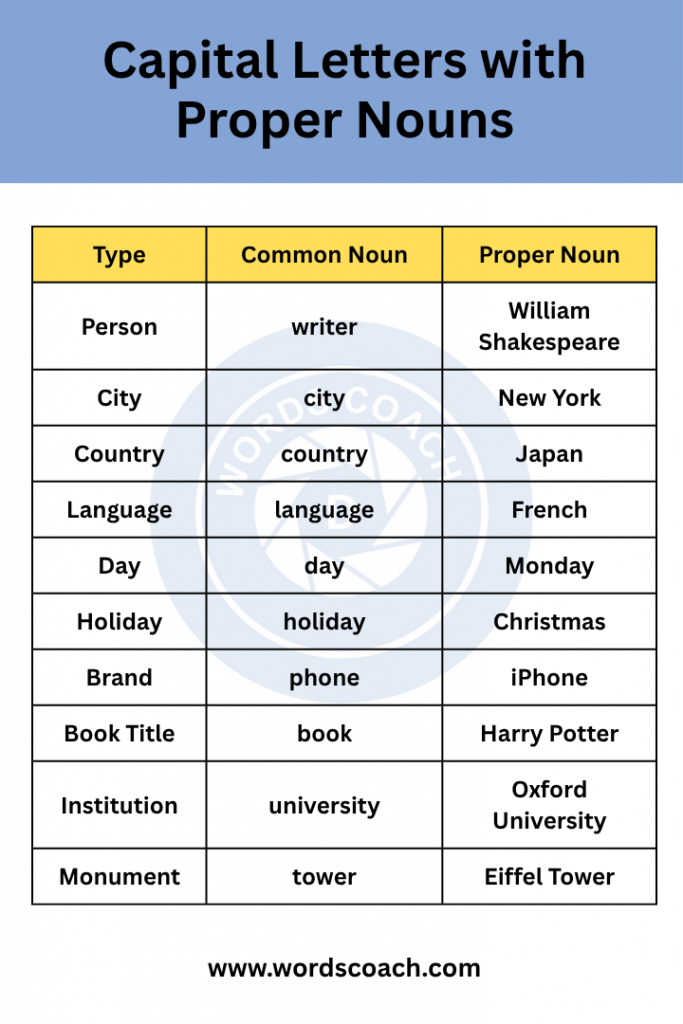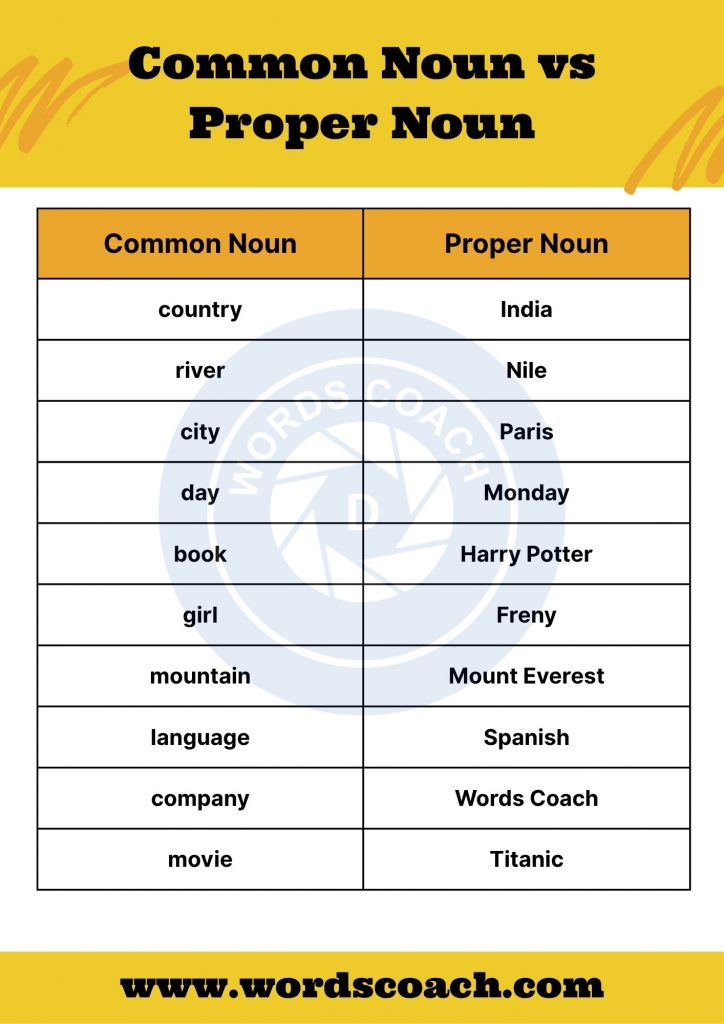Proper nouns play a significant role in language and communication. They are a type of noun that is used to name specific people, places, organizations, and things. Unlike common nouns, which are more general and refer to a class or category, proper nouns pinpoint individual entities. In this blog, we will delve into the definition of proper nouns, explore the rules governing their usage, and provide examples to enhance your understanding.
What is a Proper Noun?
A proper noun is a word used to identify a unique, specific person, place, thing, or organization. It always begins with a capital letter, regardless of its position in a sentence. Proper nouns distinguish particular entities from others within a category.
Rules for Proper Nouns:
- Capitalization: Proper nouns are always capitalized. This rule applies to the first letter of the noun, regardless of its position within a sentence.
- Individual Identification: Proper nouns are used to name specific individuals, such as people’s names (e.g., John, Mary), specific locations (e.g., Paris, Mount Everest), unique organizations (e.g., Apple Inc., United Nations), and specific titles or trademarks (e.g., Coca-Cola, Harry Potter).
- No Plural Form: Proper nouns do not have a plural form unless they represent a group of people or places. For example, “the Johnsons” refers to multiple individuals with the last name Johnson.
- No Articles: Proper nouns are not preceded by articles like “a,” “an,” or “the” unless they are part of a specific title or phrase. For instance, “The Eiffel Tower” or “The Beatles.”
Usage and Examples of Proper Nouns:
- People’s Names: John, Emma, Albert Einstein, Oprah Winfrey.
Example sentence: Sarah invited Emily to her birthday party. - Geographic Locations: London, Amazon River, Great Barrier Reef.
Example sentence: I dream of visiting the Taj Mahal one day. - Organizations and Institutions: Google, Harvard University, United Nations.
Example sentence: Microsoft announced a partnership with the World Health Organization. - Titles and Trademarks: Harry Potter, Coca-Cola, iPhone.
Example sentence: She bought the latest iPhone model. - Calendar Terms: Sunday, July, Christmas.
Example sentence: They planned a trip during the Thanksgiving holiday. - Historical Events: World War II, Renaissance.
Example sentence: The Declaration of Independence was signed in 1776.
Common Noun vs Proper Noun
| Type | Definition |
|---|---|
| Common Noun | A general name for a person, place, thing, or idea. Not capitalized unless at the beginning of a sentence. |
| Proper Noun | A specific name for a particular person, place, thing, or idea. Always capitalized. |
| Common Noun | Proper Noun |
|---|---|
| country | India |
| river | Nile |
| city | Paris |
| day | Monday |
| book | Harry Potter |
| girl | Ananya |
| mountain | Mount Everest |
| language | Spanish |
| company | |
| movie | Titanic |
Common Noun vs Proper Noun Example Sentences
- Common Noun: The girl is reading a book.
- Proper Noun: Ananya is reading Harry Potter.
- Common Noun: We visited a city last summer.
- Proper Noun: We visited Paris last summer.
Capital Letters with Proper Nouns
| Type | Common Noun | Proper Noun (Capitalized) |
|---|---|---|
| Person | writer | William Shakespeare |
| City | city | New York |
| Country | country | Japan |
| Language | language | French |
| Day | day | Monday |
| Holiday | holiday | Christmas |
| Brand | phone | iPhone |
| Book Title | book | Harry Potter |
| Institution | university | Oxford University |
| Monument | tower | Eiffel Tower |
Example Sentences:
- Incorrect: i visited paris last summer.
Correct: I visited Paris last summer. - Incorrect: he speaks english and spanish.
Correct: He speaks English and Spanish. - Incorrect: the queen lives in london.
Correct: The Queen lives in London.
Common Mistakes to Avoid:
| Incorrect | Correct |
|---|---|
| my friend lives in delhi. | My friend lives in Delhi. |
| she is reading the bible. | She is reading the Bible. |
| we visited red fort. | We visited the Red Fort. |
Proper Nouns without THE
In English, we sometimes use the definite article “the” before proper nouns — but not always. In fact, many proper nouns are used without “the.”
Names of People
❌ The John is my friend.
✅ John is my friend.
Examples:
- Albert Einstein
- Riya Kapoor
- William Shakespeare
Most Countries
❌ The India is a large country.
✅ India is a large country.
Examples:
- India
- Japan
- France
- Brazil
✅ Exceptions (use “The”): The Netherlands, The Philippines, The United States, The United Kingdom
Cities and Towns
❌ The London is beautiful.
✅ London is beautiful.
Examples:
- Tokyo
- Mumbai
- Paris
- Delhi
Continents
❌ The Asia is diverse.
✅ Asia is diverse.
Examples:
- Europe
- Africa
- Australia
Languages and Nationalities
❌ The Spanish is difficult.
✅ Spanish is difficult.
Examples:
- Hindi
- English
- French
- Korean
✅ Use “the” when referring to the people as a group:
✅ The Spanish are known for their cuisine.
Most Companies & Brands
❌ The Google is a search engine.
✅ Google is a search engine.
Examples:
- Apple
- Amazon
- Microsoft
- Samsung
Subjects of Study
❌ The Mathematics is interesting.
✅ Mathematics is interesting.
Examples:
- Physics
- History
- Biology
- Economics
Proper nouns are essential linguistic tools that enable us to identify specific individuals, places, organizations, and things. Understanding the definition, rules, and usage of proper nouns is crucial for effective communication. By following the capitalization rules and recognizing when to use proper nouns, you can enhance the clarity and precision of your writing. So, whether you’re writing a formal document or engaging in everyday conversation, proper nouns help you communicate with accuracy and distinction.
Download Word Coach Application







